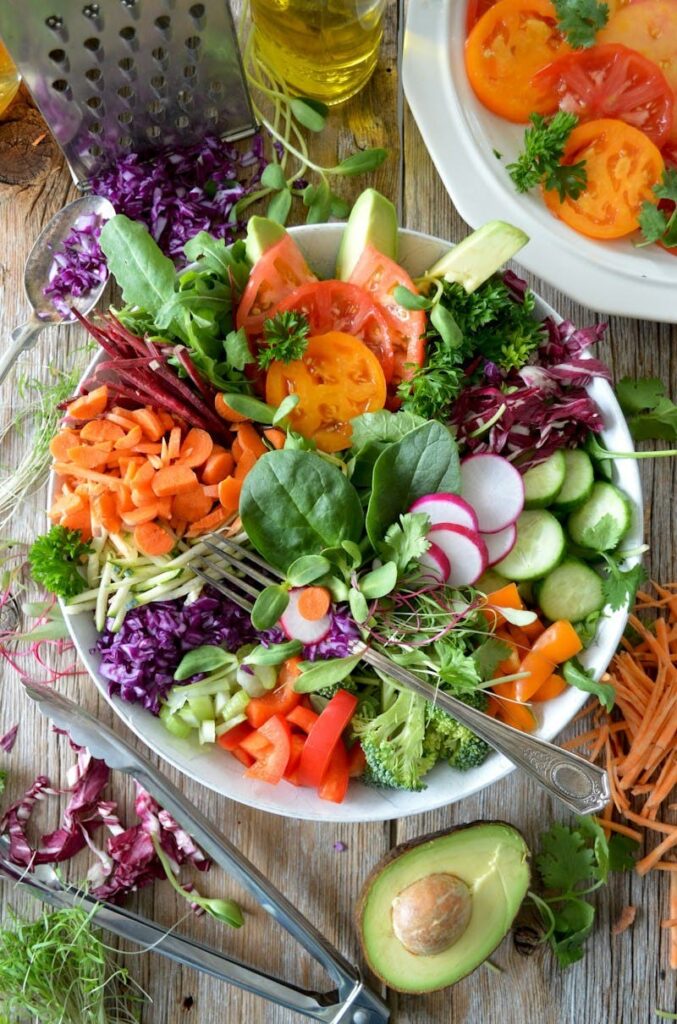This is a guest post by Prudence Sinclair.

Hello, lovely YOU!
Do you ever get “gut feelings” about something? Do you ever wonder where that expression comes from? It’s not really just a saying, is it? There seems to actually be a connection between our ‘guts’ and our emotions.
Science is now revealing that there is, indeed, a fascinating and complex relationship between gut health and mental well-being. This communication channel, known as the gut-brain axis, offers us some pretty amazing insights into mental health.
What’s Our Gut Microbiome Trying to Tell Us?
Our guts (AKA our gastrointestinal tract) houses not millions, not billions, but TRILLIONS of microorganisms that are collectively known as the ‘gut microbiome.’ This diverse community plays a crucial role in digestion, immune function, and even nutrient production and absorption.
But research now also suggests our gut microbiome significantly impacts our mental health! It turns out this colony of microorganisms communicates with our brain through various pathways, including:
The Vagus Nerve
This major nerve acts as a highway, carrying signals between the gut and the brain. It relays information about gut inflammation, microbial activity, and nutrient levels, influencing mood, stress response, and even social behavior.
Neurotransmitters
Our guts produce a significant portion of our body’s serotonin and dopamine, key neurotransmitters regulating mood and cognition. Disruptions in gut bacteria can affect their production, leading to imbalances linked to anxiety and depression.
Immune System
The gut microbiome influences the immune system, which in turn can impact brain function and inflammation. Chronic inflammation has been linked to mood disorders and cognitive decline.
Research is also now unraveling the gut-brain connection’s impact on mental health. For instance, studies are now showing a strong link between gut dysbiosis (imbalanced gut microbiota) and increased anxiety and depression. Conversely, interventions promoting gut health, such as probiotic supplementation, have shown potential in improving mood and reducing symptoms.
Our gut microbiome also plays a role in regulating our body’s stress response, particularly regulating the stress hormone cortisol. When our guts are out of whack, the result is often an increased stress response that then impacts our mood, sleep, and cognitive function. And speaking of cognitive function, research is showing us that the health of our microbiome influences things like memory and even our ability to learn. There is also data that points to gut dysbiosis and conditions like Alzheimer’s disease and dementia.
Show Your Gut Some Love!
The older I have gotten and the more I have researched the gut microbiome and everything it influences, the more I realize I need to protect and pamper mine at all costs.
We all know eating more fermented foods can help get our guts back in order, and I STRONGLY encourage you to do just that. Here are some other ways you can help your gut microbiome thrive so it can help YOU thrive:
Stop Eating Junk
Processed foods laden with high fructose corn syrup and trans fats absolutely destroy the beneficial bacteria colonies in our guts. Please stop eating that garbage. This should be your very first step in promoting gut health.
Get Some Sun
Vitamin D deficiency is linked to gut imbalances. I have written in the past how sunscreen is actually unhealthy – if not dangerous -to our health for many reasons. And I am someone who was diagnosed with melanoma and given only 6 months to live! And I can tell you from the bottom of my heart, mind and GUT, we NEED some sun exposure every day. New science is pointing to seed oils in the skin that may be the real cause of skin damage/cancer from the sun’s UV radiation.
From this study: Lipid peroxidation (LPO) is in this context one of the major pathways by which photo-oxidative stress disturbs cell signalling and promotes photocarcinogenesis and photoageing.
In plain english; Lipids are fats (AKA seed oils in the skin) that, when the sun’s UV rays hit them, oxidize and cause skin damage.
You don’t need to go crazy and lay in the sun without sunscreen for hours at a time. I am simply suggesting getting 20 minutes or so every day.
Go Wild (With Herbs)
Herbs like thyme, oregano, and rosemary contain natural antimicrobials that can help keep harmful gut bacteria in check. Add them liberally to your cooking.
Move Your Body, Move Your Gut
Exercise, even gentle forms like yoga or walking, stimulates gut motility and reduces bloating. Gut motility refers to the intestines’ motion that moves our stool along so it can get out of us as quickly as possible. When we are constipated, and the stool just sits there, it allows harmful bacteria to take over the guts.
Find an activity you enjoy and move your body regularly.
Get Some Sleep!
Forget your Ps and Qs – mind your zzzzzzzs. Chronic sleep deprivation disrupts our gut microbiome. You MUST prioritize sleep to have a healthy gut!
LOL
Studies show humor can positively impact gut health by reducing stress hormones. Watch a funny movie, spend time with loved ones, or find activities that bring you joy.
Final Thoughts
I know many of us are feeling pretty bleak these days. The world is going crazy, everything is so expensive, there’s constant talk about war and more pandemics. It’s all a bit too much.
But I want to remind you that we all have a lot more personal power than we sometimes remember. While we can’t necessarily control the financial or geopolitical landscape, we CAN control how we respond to the craziness all around us.
Let’s all take very good care of our guts so we can better handle the stress around us. By understanding the gut-brain axis and making conscious choices about our diet, lifestyle, and stress management, we can nurture a healthy gut and potentially improve our mental health and emotional well-being.
Prue – https://www.pruesplace.org
Photo Attribution: https://www.nadineprimeau.com/

